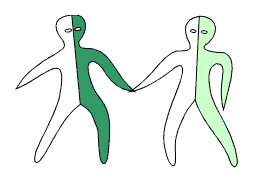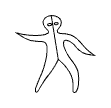Download This Content
APoGI for the Haemoglobin Disorders
![]()
Download This Content ![]()
This couple could have a child with haemoglobin H disease.
| Partner who carries alpha zero thalassaemia |  |
Partner who carries alpha plus thalassaemia | |
 |
 |
 |
 |
| Not a carrier | Carrier of alpha zero thalassaemia | Carrier of alpha plus thalassaemia | Child with "haemoglobin H disease" |
In each pregnancy, there are four possibilites:
... is a moderate form of anaemia. It is unfortunate that doctors call it a disease, because most people with haemoglobin H disease lead a normal life. They go to school, work and have children just like other people. They occasionally need additional medical treatment, and should attend a haematology clinic every year for a check-up.
This couple should see a specialist in haemoglobin disorders for expert information. Once they have seen a specialist most couples are not worried about the possibility of having a child with haemoglobin H disease. They usually ask for the baby to be checked when it is born, to see if it has Haemoglobin H disease or not.
![]()
![]() Adobe Acrobat format (PDF) in colour and black-and-white
Adobe Acrobat format (PDF) in colour and black-and-white
![]() Microsoft Rich Text Format in colour and black-and-white
Microsoft Rich Text Format in colour and black-and-white
![]()
These documents are part of the APoGI May 1998 (Evaluation) Release and are made available subject to the APoGI Disclaimers covering usage, distribution and copying.
Problems or further enquiries to APoGI@chime.ucl.ac.uk or the APoGI Contacts
Copyright © 1984 -1998 UCL Medical School. All rights reserved.